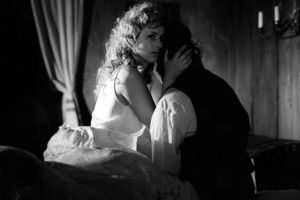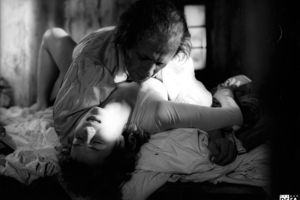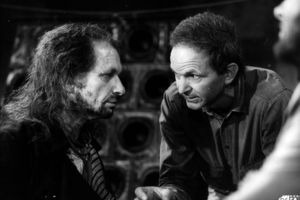Treffen in Travers
Director: Michael Gwisdek, 105 Min., Color, Feature Film
Deutsche Demokratische Republik (DDR)
DEFA-Studio für Spielfilme, 1988
- Film/Video Format
- 35 mm
- Length in m
- 2891
- English Title
- Encounter in Travers
- Premiere Date
- Release Date (for Cinema)
- Literary Source
- Hofmann, Fritz: "Treffen in Travers", Erzählung
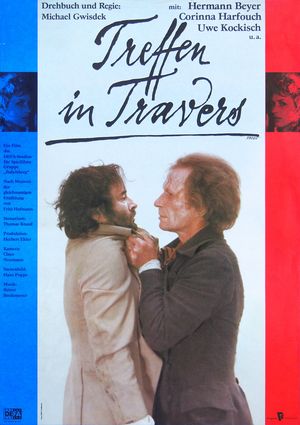
(Dir.: Michael Gwisdek, 1988) Graphic Design: Hans-Eberhard Ernst
Short Summary (English)
It’s 1793. In the shadow of the French Revolution, the neutral Swiss town of Travers becomes the scene of private changes. The revolutionary Georg Foster meets with his wife Therese to discuss their divorce. Therese arrives accompanied by her two daughters and her new lover, the Saxon poet Ferdinand Huber. Forster is physically and mentally devastated by the revolution in Paris. The following three days develop into a wild ride through the psychological highs and lows of the three.
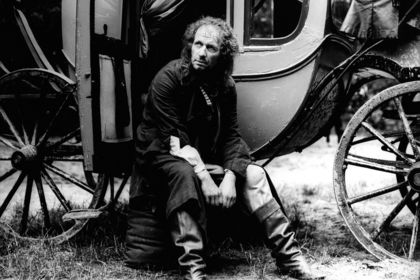
(Dir.: Michael Gwisdek, 1988) Photography: Klaus Goldmann
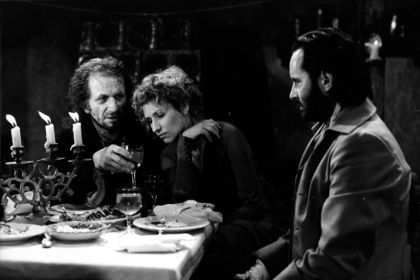
(Dir.: Michael Gwisdek, 1988) Photography: Klaus Goldmann
Film Crew
- Director
-
- Michael Gwisdek
- Script
-
- Michael Gwisdek
- Thomas Knauf
- Scenario
-
- Thomas Knauf
- Camera
-
- Claus Neumann
- Film Editing
-
- Evelyn Carow
- Cast
-
- Hermann Beyer (Georg Forster)
- Corinna Harfouch (Therese Forster)
- Uwe Kockisch (Ferdinand Huber)
- Peter Dommisch (Leonidas, Wirt)
- Heide Kipp (Marthe, Wirtin)
- Wolf-Dietrich Köllner (Rougemont, Staatsrat)
- Astrid Krenz (Liese, Kindermädchen)
- Andreas Schneider (Jean-Claude, Gendarm)
- Hark Bohm (Bürgermeister)
- Michael Kind (Preußischer Geheime)
- Herbert Olschok (Preußischer Geheime)
- Horst Krause (Grenzbeamter)
- Jochen Ziller (Offizier)
- Susanne Bormann (Röschen Forster)
- Lucie Gebhardt (Klärchen Forster)
- Johannes Gwisdek (Junge)
- Robert Gwisdek (Junge)
- Bernd Schirmer (Kutscher)
- Kurt Götz (Kutscher)
- Assistant Director
-
- Hanna Seydel
- Assistant Camera
-
- Peter Bernhardt
- Klaus Goldmann
- Production Design
-
- Hans Poppe
- Script Editing
-
- Christoph Prochnow
- Music
-
- Reiner Bredemeyer
- Sound
-
- Hans-Joachim Kreinbrink
- Konrad Walle (Tonmischung)
- Costume Design
-
- Katrine Cremer
- Make-Up
-
- Jürgen Holzapfel
- Irmela Holzapfel
- Props
-
- Werner Zettler
- Production Management
-
- Herbert Ehler
- Unit Production Management
-
- Antje Wittfoth
- Peter Vogel
- DEFA Photography
-
- Klaus Goldmann
Awards
- Filmfestspiele in Cannes (1989): Einsatz
- 6. Spielfilmfestival der DDR Berlin (27.05.-31.05.) (1990): Hauptpreis
- 6. Spielfilmfestival der DDR Berlin (27.05.-31.05.) (1990): Preis fü männliche Hauptrolle - Hermann Beyer
- 6. Spielfilmfestival der DDR Berlin (27.05.-31.05.) (1990): Preis für weibliche Hauptrolle - Corinna Harfouch
- Sektion Theorie und Kritik des Verbandes der Film- und Fernsehschaffenden der DDR (1990): Kritikerpreis "Die große Klappe", Bester DEFA-Spielfilm 1989
Short Summary (German)
1793. Im Schatten der Französischen Revolution wird der neutrale Schweizer Ort Travers zum Schauplatz privater Veränderungen. Der Revolutionär Georg Forster trifft seine Noch-Ehefrau Therese, um die Scheidung zu besprechen. Therese reist in Begleitung ihrer beiden Töchter und ihrem neuen Geliebten, dem sächsischem Dichter Ferdinand Huber an. Forster ist physisch und psychisch von der Revolution in Paris stark mitgenommen. Die folgenden drei Tage entwickeln sich zu einem wilden Ritt durch die psychischen Höhen und Tiefen der Drei.
Short Summary (Other Languages)
Nell'autunno del 1793 Georg Forster, trasferitosi a Parigi, s'incontra con sua moglie Therese in una locanda in Svizzera per discutere con lei del divorzio. Therese si presenta all'appuntamento con i loro due figli e il suo nuovo compagno Ferdinand Huber. Forster, debilitato fisicamente e psichicamente dalle lotte rivoluzionarie in Francia, cerca di convincere Therese a seguirlo a Parigi, accettando persino la presenza di Huber. Therese, costretta a vivere in esilio in Svizzera per l'attivismo politico di suo marito, vuole il divorzio per poter rientrare in Germania. Anche lei cerca di convincere Forster a seguirla, affinché ritrovi un po' di tranquillità. Nonostante lei lo ami ancora, rifiuta di seguirlo a Parigi, convinta che Forster sacrificherà sempre la sua vita privata a favore della rivoluzione. Inoltre, Therese sa di non poter più vivere senza Huber. (Italienisch)

